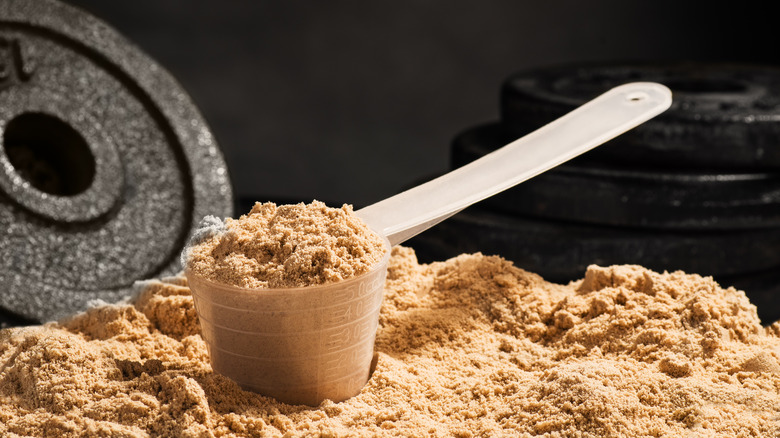Ward Off Cancer With This Unexpected Protein Source
Second only to heart disease, cancer is one of the leading causes of death in the United States, according to the Centers for Disease Control and Prevention. While medical breakthroughs and early detection have helped to reduce the number of cancer deaths, nearly one in 10 people have received a cancer diagnosis at some point in their lives.
You're probably already aware of the lifestyle factors that contribute to your risk of cancer. Quitting smoking is a big one to lower your risk of not only lung cancer but also cancers of the throat, bladder, stomach, and colon, just to name a few. The hormonal change due to weight gain increases your risk of breast, thyroid, brain, and liver cancers. Protecting your skin plus 150 minutes of weekly exercise can lower your risk of cancer.
Let's not forget diet. That bacon you love is one of the many processed meats that are linked to cancer. High-fat, high-sugar, and overly processed foods challenge your body's immune system. Instead, aim for vegetables, fruits, whole grains, and lean protein sources to keep your body in good health. One protein source you might not expect has potential anticancer benefits. The next time you make a smoothie, try adding whey protein to support your immune system and fight cancer.
Whey protein supports people with cancer
People who already supplement their diets know what happens to their bodies when they start taking whey protein. A 2024 article in Food and Humanity said that bioactive compounds not only help build muscle and recover from a hard workout, but they also might tackle cancer. Whey protein contains special compounds that can interfere with the way cancer cells grow and spread by blocking certain cellular pathways involved in cancer development. In particular, the lactoferrin in whey protein might slow the growth of cancer cells, kill cancer cells, and prevent the formation of blood vessels that support tumors. However, clinical studies on humans haven't found direct anti-cancer properties of whey protein, according to a 2019 review in Pharmacological Research.
Whey protein can also support traditional cancer therapies such as chemotherapy and radiation by helping to reduce side effects. Supplementing with whey protein can protect against cancer-related weight loss and muscle wasting, known as cancer cachexia syndrome. The high amount of the amino acid leucine found in whey protein supports muscle growth, and whey protein affects the IGF-1 hormone that aids in developing muscle.
Whey protein supports immunity
Although whey protein might not reduce your risk of cancer, it could protect your health by boosting your immune system. Whey makes up 20% of the protein in milk (the other 80% is casein protein), and because whey is quickly digested, the amino acids can get right to work in healing the body. Branched-chain amino acids like valine, leucine, and isoleucine found in whey are key in repairing tissues in your body.
Whey protein also has cysteine and methionine, which are two amino acids used by your body to make glutathione. Glutathione fights free radicals and reduces oxidative stress. As you age, your body loses glutathione, so supplementing with whey can keep your immune system strong. It might seem logical to simply get your whey protein from milk, but you'd have to drink a lot of milk to get the same benefits from a whey protein supplement. Besides, milk's pasteurization process reduces the anticancer cysteine amino acid.


